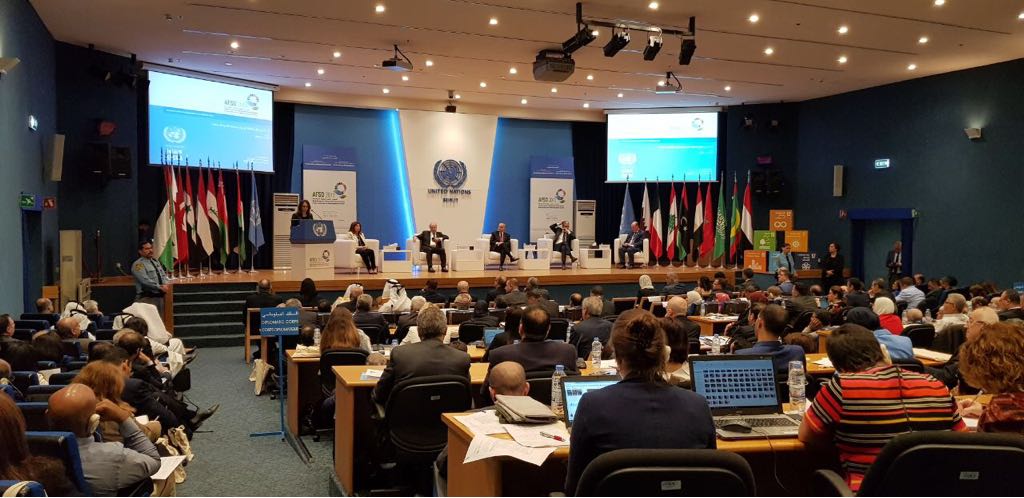Beirut, 24 April 2018 (Communication and Information Unit)--- On Tuesday, the Economic and Social Commission for Western Asia (ESCWA) welcomed a record number of participants at its headquarters in Beirut for its annual Arab Forum for Sustainable Development (AFSD), this year focused on “Natural Resources, Future Generations, and the Common Good”.
Under the patronage of Lebanon’s President of the Council of Ministers H.E. Mr. Saad Hariri, over 250 representatives from government, civil society, the private sector, international and regional organizations, and youth came together in a space dedicated to fostering a culture of knowledge exchange and a spirit of collaboration and dialogue.
The three-day Forum kicked-off with an opening session that included welcome remarks from Executive Secretary of ESCWA, Mohamed Ali Alhakim; UN Deputy Secretary-General, Amina J. Mohammed; Director of Sustainable Development and International Cooperation at the League of Arab States (LAS), Nada Al Agizy; Regional Director of the United Nations Population Fund (UNFPA), Luay Shabaneh; Minister of Energy, Mines and Sustainable Development of Morocco, Aziz Rabbah; Lebanese Minister of Culture, Ghattas Khoury, representing the President of the Council of Ministers, Saad Hariri; and ESCWA Sustainable Development Officer, Maisaa Youssef.
“This forum raises a series of questions: How can we turn the exploitation and management of our natural resources towards sustainability and the common good?” asked the Executive Secretary of ESCWA, Mohamed Ali Alhakim, in his opening statement.
“What are our roles today at this forum, what are our capacities and the opportunities presented to us in order to support a transformation in the Arab world in line with our needs, those of future generations, and all within the spirit of the 2030 agenda?” he continued.
Mr. Alhakim shared key actions that are essential to guarantee sustainability and justice, and stressed that “development is a right for all.”
“First, the Agenda—which has inter-linked goals—cannot be realized without a participatory approach. Second, sustainable development in our Arab region depends on the empowerment of all categories, especially youth and women. Third, we need to reconsider the way we are exploiting our natural resources and our economic policies, and make them more sustainable,” he stated.
In a video message to the AFSD, Amina J. Mohammed, UN Deputy Secretary-General said: “At a time when many countries confront crises, conflicts and economic stress, delivering on the 2030 Agenda for Sustainable Development offers a way forward in ridding the world of poverty and building peaceful, just and inclusive societies.”
“Already, ESCWA countries face drought and water insecurity. Without urgent action, we could see the loss of agricultural livelihoods, serious depletion of natural resources, even higher unemployment and mass displacement. We need more effective management of the environmental impacts of the region’s extractive industries, and more ambition overall in meeting the climate threat. And we need to find the political will to move towards sustainable consumption and production patterns,” she warned.
The Director of Sustainable Development and International Cooperation at the League of Arab States (LAS), Nada Al Agizy, highlighted the importance of partnerships in tackling exceptional challenges in the Arab region, including threats to biodiversity and other resources.
The Regional Director of the United Nations Population Fund (UNFPA), Luay Shabaneh, underlined that the respect of basic freedoms, their protection and promotion, needs to be the pillar of sustainable development, with the "social agenda" at the forefront of all efforts.
Meanwhile, Aziz Rabbah, the Minister of Energy, Mines and Sustainable Development of Morocco said that the digital revolution represents a great opportunity for the Arab region to make sustainable development a fundamental cultural, social and economic reality.
"Sustainable development is an opportunity for the Arab world. We should not lose it. We need to know how to benefit from resources for the sake of future generations," he said.
The Lebanese Minister of Culture, Ghattas Khoury, underscored that "we are living in an era of technology and social media, where people are part of the decision-making process. The 2030 Agenda requires these collective efforts based on mutual understanding and responsible citizenship.”
Before the launch of the plenary and special sessions, ESCWA Sustainable Development Officer, Maisaa Youssef, shared an overview of prospects and challenges related to the 2030 Agenda for Sustainable Development.
“The ability to persevere and insist on finding opportunities for innovation and development is what constitutes the identity of serious and sustainable development work,” she stressed. “This is what brings us together today in this forum to monitor improvements in our countries."
Today’s events featured two plenary sessions that tackled development planning in the Arab region since the adoption of the 2030 Agenda, and the extent to which Voluntary National Reviews (VNRs) are being utilized to accelerate implementation and enhance accountability.
In the afternoon, three special sessions focused on “VNRs: Sharing Lessons Learned,” “Arab Civil Society Platform,” and “Water and SDGs: An Arab Perspective.”
The AFSD is the primary regional mechanism for the follow up and review of the implementation of the 2030 Agenda for Sustainable Development in the Arab region. This regional Forum is also relevant at the global level; its outcome gives voice to the region at the High-level Political Forum (HLPF) on Sustainable Development. The report of the Arab Forum sets out key messages emanating from the regional dialogue on the opportunities and challenges of implementing the 2030 Agenda and reporting progress on key sustainable development priorities.
The final report of the AFSD-2018 will be presented by Lebanon, Chair of AFSD-2018, as the main contribution of the Arab region to the HLPF in July. It will also be submitted at the upcoming ESCWA ministerial session.
Click here for the full Agenda.
For more information:
Nabil Abu-Dargham, Head, ESCWA Communication and Information Unit
+961-70-993-144; email: dargham@un.org
Ms Rania Harb +961-70-008-879; email: harb1@un.org
Ms Myrna Mahfouz: +961-70-872-372; email: mahfouz@un.org
Mr Haidar Fahs: +961-70-079-021; email: haydar.fahs@un.org




